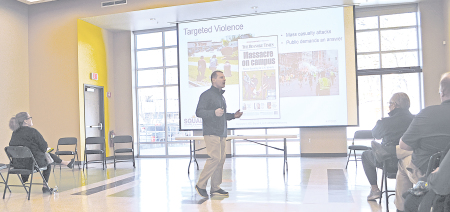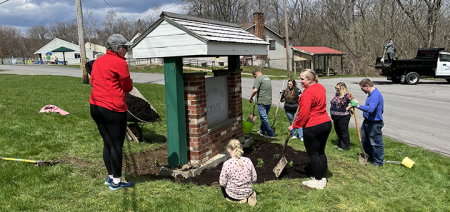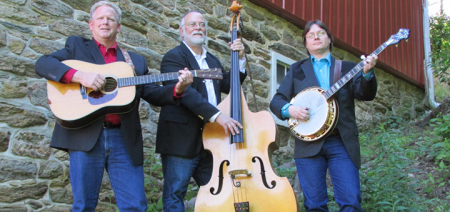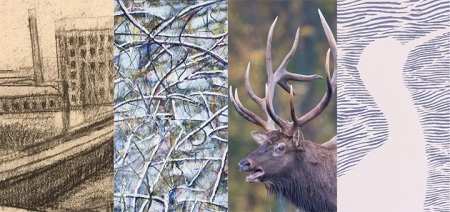A Trip To Italy Pt. II: The Gold Bracelet
Published:
November 7th, 2006

The Gold Bracelet
By Mary Musson
Correspondent
She polished it, and I watched in reverential silence.
It was a ritual both exciting and sad and I looked forward to it with a mixture of expectation and dread because I knew that in the end, she would always cry and like any child, I hated to see my mother cry.
She kept it rolled up in a soft red cloth, buffered still by one of my father’s old woolen socks and tucked away in a secretive little drawer made for such possessions deep inside the tall mahogany wardrobe in the master bedroom. I intuitively sensed when it was time to fetch it because her mood would suddenly change, spurred by a song on the radio, or a conversation with Dad in which they spoke their strange sounding dialect, or a piece of mail in the familiar thin onion skin envelope that meant air mail delivery from Italy. It didn’t take much to make her nostalgic for her home and family back home in Molfetta. She had given up a lot by following my father to Argentina to seek his fortune and although she loved this new and vibrant land that they had found, she missed her home. And so, every other month or so she would go to the wardrobe and retrieve the precious little bundle and I would watch her gently peel away the soft red cloth to reveal the treasure within – a cuff of pure pink gold, bold and shiny and cool to the touch. It’s only decoration a few thin coils of gold holding tiny pearls and emeralds in a half moon design. She would polish it with the wool sock, look at it for an extra minute or two, then return it to its hidden place in the wardrobe.
She never wore it. When I once asked her why, she replied, “I don’t deserve it,” but she insisted I touch it and admire it. “This,” she often reminded me, “is your grandmother Angela’s bracelet. Your named for her, Mariangela, and someday this will be your bracelet to remember her by.”
It didn’t happen. I didn’t want it.
When she died, I tossed it into a drawer in my bedroom bureau and purposely forgot about it. I didn’t want any visible proof of my mother’s sadness to linger in my life. She and I had always had a complicated relationship, one in which her need for me was too strong and although I loved her deeply, I had always felt that any show of love on my part was never enough, not in quantity or quality. After she died, I found the bracelet, just one more thing among the mountain of stuff she left behind for me to sort through and find a place for. I ended up giving almost all of it away to the Pink Door, the Salvation Army, Catholic Charities and the Major’s Inn in Gilbertsville, which now houses her furnishings. I kept her embroidery, gorgeous samples of Italian needlecraft at its best which I loved because it reminded me of how much she loved her work as a master embroiderer and maker of such fine things as wedding trousseaus and baptism gowns. My memories of her working at her craft while we lived in Argentina were good ones, because she was happy then, but, for much of her life she was not. The bracelet reminded me of that and so I kept it tucked away in the red pouch, in the old wool sock deep in a bureau drawer. A few nights before I left for Italy, I found it and placed it into my suitcase thinking that I would perhaps give it to one of Nonna Angela’s other granddaughters who might appreciate it more than I did.
I packet carefully for my trip to Italy, knowing I would be there a month and going at a time of year when summer could quickly bring cool autumn nights, so I brought both light and bulky clothing. The suitcase was also filled with gifts for my relatives since there is no going to one’s Italian hometown without small tokens for everyone and I had shopped thoughtfully. I was bringing old family photographs in thin silver frames for my aunts, electronic gadgets and CDs for the teenagers, and toys for the little ones. I had also gift-wrapped bits and pieces of mother’s costume jewelry for my cousins. She had no real gems, because our house had been broken into by thieves when we lived in the greater metropolitan area, but she loved shopping and had accumulated a nice collection. It is curious that although the thieves took every bit of jewelry she had, the bracelet had survived the home invasion by rolling under a radiator and safely hiding there until mom found it weeks later.
There were other things in the suitcase as well, things of a personal nature I’d rather not discuss here, but let’s just say that if that suitcase did not make it to my final destination, I would have been very upset. And of course, Alitalia lost my luggage and so my first few days in Italy were not as joyful as they could have been. Now, I know the power of the press, having worked in journalism for more than 30 years, so I don’t take this move lightly ... so here goes, if you fly to Italy, do not book on Alitalia. There are three flights a day leaving for Milano and Rome from Newark airport, making the transcontinental journey an easy one for experienced travelers. My airline of choice is either Continental or Lufthansa, both good carriers with comfortable planes and attentive staff. But, since I was also flying nationally from Milano to southern Italy’s airport in Bari, the largest city near my parent’s hometown of Molfetta, I had no choice but to fly Alitalia for the last leg of my journey.
In her wonderful book Under The Tuscan Sun, author Frances Mayes describes Alitalia pilots as flying planes the way they drive cars, sort of straight up, straight across with lots of gear changes and then a whopping straight down. She’s right, but I wasn’t too concerned with the flying on that short trip between Milano and Bari because I was distracted by the beautiful scenery below. I could see Italy very well on that national flight, the Alps, the Apennines, the mountain towns, the lakes and then the Adriatic Coast with its undulating edge caressing the sea. My Puglia was not hard to spot because of the gorgeous Gargano, the large bump on the calf of the Italian boot that jets it into the sea with its mountains, forests and lakes. Once I saw it, I knew I was close to home and sure enough within minutes I could see Molfetta from the air with its dry canals, those familiar wide strips which once brought mountain water to the sea, and its port and sea wall. It always moves me to see the old town from the plane and reminds me of the first time I saw it sitting next to my father when I was seventeen years old on my first trip to Italy and his first return there after a 20-year absence. I missed him so that day, but teary sentimentality soon gave way to joy and excitement as I thought about seeing my family. I wasn’t sure who would be at the airport; I expected my cousin Rino and his wife Maria to be there since they were hosting me during my stay and maybe my cousin Diana, who had also asked me to stay with her family. It would be a nice reunion.
We landed with a big bump (Alitalia up to her usual standards) and I prayed my usual token of thanksgiving to my travel angels, Michael, Raphael, Ariel and Gabriel, the same four protectors I ask to surround my car with protection when I drive Chenango County roads in winter weather ... and deer season ... and when I have my baby grandson in the car. Once landed, I quickly made my way to the baggage compartment with my fellow passengers, admiring along the way how new and modern the airport at Bari, now an international one, had become. After some 20 minutes at the carousel, I still did not see my bag and I began to worry. There were sixteen passengers with me who looked equally concerned and then the bad news from one of the porters, “The bags are finished, there are no more!”
I was amazed to see how quickly my fellow passengers sprang into action; they ran for the lost baggage department and I quickly followed. This would mean long lines as paperwork was put in place and I was concerned about my family members waiting for me. I pushed ahead to the front of the line, an Italian gesture which always leaves other Europeans, especially the British, perplexed, and was in third place when I asked the nice American from Kansas behind me to hold my place while I went out to warn my family of the delay. Security escorted me out to the main lobby and as the door opened I saw a scene that still makes me cry. There was a crowd waiting there for me of cousins and friends and my two dear 80 year old aunts, Pina and Vincenza. I was overwhelmed and reached for both of them in one large armed swoop that brought my face close to theirs. “You look like your mother,” they both said in unison crying as they reached for me.
I don’t like crying in public, so I held off and quickly turned the reunion into a joke, telling them that Alitalia had lost my bag and therefore, gesturing with thumbs and forefingers raised in a recognizable gesture, there would be no gifts for any of them. They laughed and assured me they would wait until the paperwork was filled out – after all hadn’t they waited more than 20 years for me to return to them? To cut a long, frustrating story short, it took that airline two days to return my bag and I am writing this still furious because of their attitude. They never once offered an apology and treated me like I should know better. Oh well, it could have been worse; shortly after my arrival Alitalia went on strike, a common occurrence that happens several times a year without fail, and that would have been a real pain!
Days later, I sat at the kitchen table with cousins Rino, Maria and Zia Pina. I handed my cousins their gifts which they liked very much and then I turned my attention to Zia Pina. She is my mother’s older sister, 86 years old, and the only remaining sibling with mother’s brothers Sergio and Luigi and sister Rosaria long dead. I had decided that she should get Nonna Angela’s gold bracelet because she could best decide whom to give it to. As she opened the box and took out the red bundle, she began to shake. She recognized it immediately.
“No, it can’t be,” she said. “My mother’s bracelet ... my God, what have you given me?”
Then she told me the story. It turns out that when mother left Italy to start her new life with my father in Argentina, her brothers had decided that she should get the bracelet, much to Aunt Pina’s disappointment. She had thought as the elder sister that it should have been hers. There were some hurt feelings between the sisters over that bracelet.
Now I understood why she never wore it, “I don’t deserve it,” she had said.
As I thought about the journey that bracelet had made from my grandmother’s jewelry case in Italy, to the bedroom wardrobe in Argentina, to its safe hiding place under the radiator during the robbery in New Jersey, to my own bureau drawer in Norwich, to an almost lost luggage at the airport in Italy, to this final destination in my aunt’s hands, I could feel both mom and Nonna Angela smiling down on us all. The bracelet had come home, and in a way, so had I.
Part III of this five-part series will appear in Wednesday’s Evening Sun.
Comments








